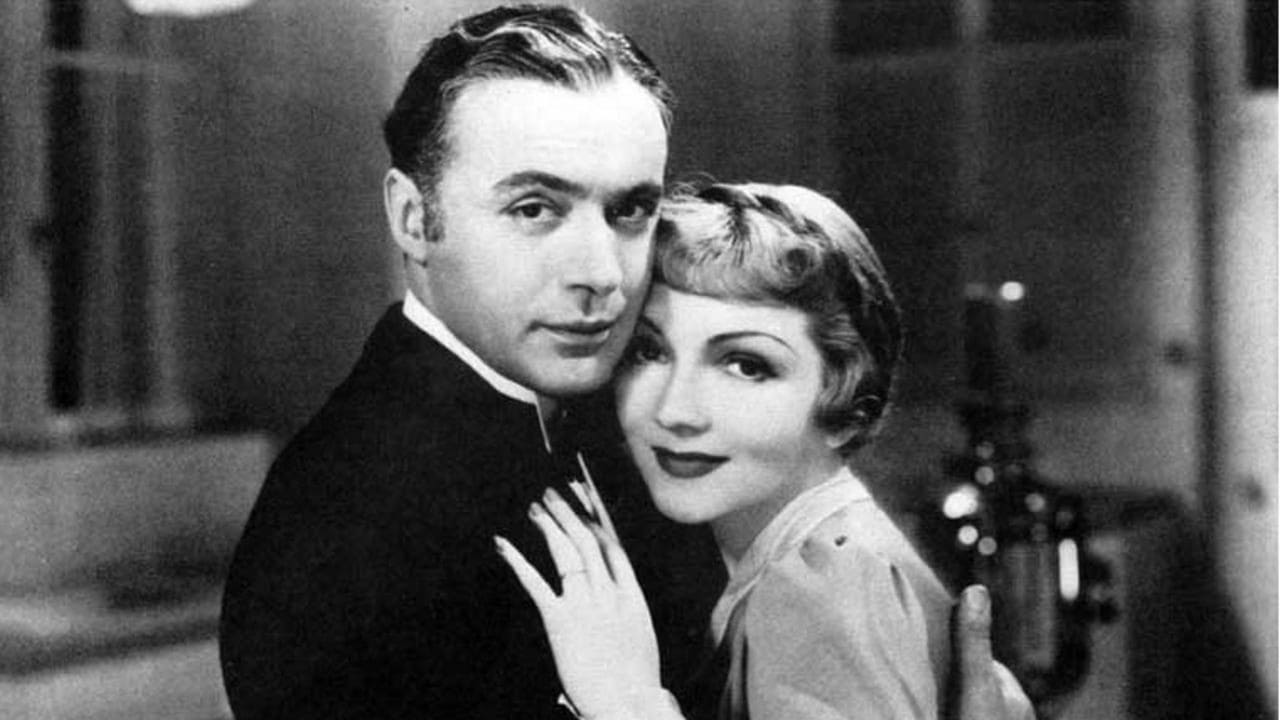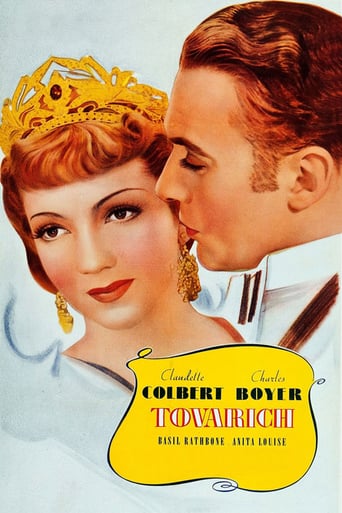

Adapted from a French play authored by Jacques Deval, Tovarich had a successful run on Broadway the year before the film came out for 356 performances. Robert Sherwood did the adaption and for the screen, the talents of Casey Robinson were brought in to adapt Tovarich to another medium. Usually these collaborative efforts tend to dilute, but in the case of Tovarich, it's bright sophisticated comedy that gives both Charles Boyer and Claudette Colbert two of their best screen roles.Boyer and Colbert play a couple of exiled Russian nobles living in genteel poverty in Paris as so many did after the Russian Revolution. She's a bit more noble than he, Colbert is actually a blood Romanov and Boyer only married into the royal family. Before he and the family were overthrown, Nicholas II gave Boyer a lot of Russian gold, smuggled out of the country which Boyer laundered to use the modern term and deposited in a French bank under his name. Although no one could have blamed him for occasionally dipping in just for the bare necessities, Boyer and Colbert have refused to do it.What they're sitting on it for, who can tell. They refuse an a request for money from another exile Morris Carnovsky for some wild scheme to restore the Romanovs. Boyer and Colbert have woke up and smelled the coffee, the Romanov restoration just ain't happening. But what to do with that money, especially when you're living one meal to the next.Colbert and Boyer take jobs as butler and maid to a wealthy Parisian family consisting of Melville Cooper, Isabel Jeans, Anita Louise, and Maurice Murphy. Reasoning after all that their former status has acquainted them somewhat with the finer things and how that life should be lived. It takes a bit of getting used to as far as the reversal of stations, but gradually they ingratiate themselves with the family.The big test comes when a dinner party is given and a Commissar from the Soviet Union played by smooth Basil Rathbone is invited. He's got some history with the Romanovs and things get both funny and tense at the same time. A real achievement for director Anatole Litvak.Tovarich was also the source of a Broadway musical from 1963 in which Vivien Leigh starred in the Claudette Colbert role.If you think you've figured out who the good and bad people are than you are in for a surprise. Tovarich takes no sides in the politics, it presents the Bolsheviks and Romanovs with all the warts showing. It does it with sparkling humor as well. Try to catch it when broadcast next.
... View MoreThis nice little comedy (based on a French play that Robert Sherwood rewrote) deals with a matter that was of interest around the entire world after 1917 - 1921. What happened to the remnants of the Russian aristocracy left in tatters by the hurricane of the Bolshevik Revolution? The fact was that for most of them who fled or escaped Russia there was only poverty left to face - the great estates and the jewelry and wealth had been confiscated by the revolutionary government of Lenin and Trotszky. A few had been smart enough to have funds and wealth in lands outside the borders of old Russia, but most never thought of it.Charles Boyer is Prince Mikhail Ouratieff and Claudette Colbert is Grand Duchess Tatiana Romanoff. You have to get that straight first, because although Boyer is a Prince he is not of the royal blood (as Colbert is - being of the Tsar's family). They are married (and quite loving) but Colbert is of higher social rank - so in many scenes Boyer is forced to agree to her point of view. However, Boyer has one thing that is more important. As an aide to the Tsar (one of his duties was to tell Nicholas II what the weather was each day) he was entrusted before the end of the Empire with over 20 million francs of Romanoff money kept in a French bank. This was a sign of the Tsar's great faith in Boyer's devotion, but it was a mixed blessing. He and Colbert were caught, and she was tortured by a leading Commissar, one Dimitri Gorotchenko (Basil Rathbone). However they managed to escape.Now in Paris some dozen years after fleeing Russia they are living in poverty. All Boyer has is a sword and a flag. But French bankers are aware that he has legal title to use the million of francs in the Romanoff accounts and hope he will. Few have the illusion that the Soviet regime is going to collapse. But, as Boyer keeps insisting, the money is not his to spend - it's the Tsar's. He was entrusted to keep it for the day of return to Holy Russia. As Boyer keeps saying, he won't spend anything: "Not a billion, not a million, not a thousand, not a sou!"But he and Colbert have to survive. They start looking at the want ads and find a job for a butler and maid at the home of a Mr. and Mrs. Dupont, a wealthy banker and his wife (Melville Cooper and Isabel Jeans). There are also a daughter and son (Anita Louis and Maurice Murphy). Boyer and Colbert figure that their service to the Russian Royal Family in St. Petersburg's Court prepares them for being servants. After an initially bad moment or two (particularly as the four Duponts are all somewhat selfish and demanding), Boyer and Colbert gradually win the family over by their charm, their physical attractions, and their ability to figure out how to satisfy the needs of the employers and to do the various activities in the house. But they also discover the secret of labor unions, and (horrible though it may seem) how it may behoove to join one for servants.Then comes the critical point: a large oil deal is being set up by a consortium from Britain, France, and the Netherlands, to develop two Russian oil fields. This is unheard of - and actually Stalin's Russia is not too thrilled about having foreigners control their oil. So they send their best man to deal with this problem and meet Dupont and his associates. You got it - it's Rathbone. TOVARICH has actually not aged too badly, even though the old Soviet Union is a thing of the past too. Boyer and Colbert make a sweet, lovable pair - willing to do anything to be successful as servants. Cooper, Jeans, Louise, and Murphy eventually show more human features, such as Cooper's momentary lapses (at one point the banker can't recall his own name). And Rathbone, although capable of governmental viciousness (in his off-screen torturing of Colbert) actually wins our respect in the end - he turns out, like Boyer and Colbert, to be as patriotic as they are. With NINOTCHKA and COMRADE X, TOVARICH makes up a trilogy of film comedies that do paint a picture of the plight of a mighty nation struggling to regain it's feet, in the face of internal disarray and rivalries, and foreign hostility. Certainly a worthy film.
... View MoreAfter reading many positive reviews, I was very excited to watch this movie. The script turned out to be the biggest turn off for me. The very first scene, where the 14th of July is celebrated in Paris, catches our poor protagonists (Russian aristocracy, no less) being totally oblivious to the meaning of the festivities. I had a hard time swallowing this. Come on... Russian aristocrats learned French language and French culture before they learned Russian language and culture. I doubt it very much that they did not know what 14th of July meant for the French. I know that it's supposed to be a sophisticated continental comedy, but please do not insult our intelligence in a process. From this uninspired start, the movie just dragged on and on and on. Both Boyer and Colbert were wasted in this mediocre material. They deserved better!
... View MoreClaudette Colbert and Charles Boyer make a delightful team in this stylish thirties comedy. This film is creative and amusing in much the same manner as My Man Godfry. For anyone who enjoys black and white films this will be enjoyable. It has something about it of the grace and style of the old Fred Astaire/Ginger Rogers films.
... View More